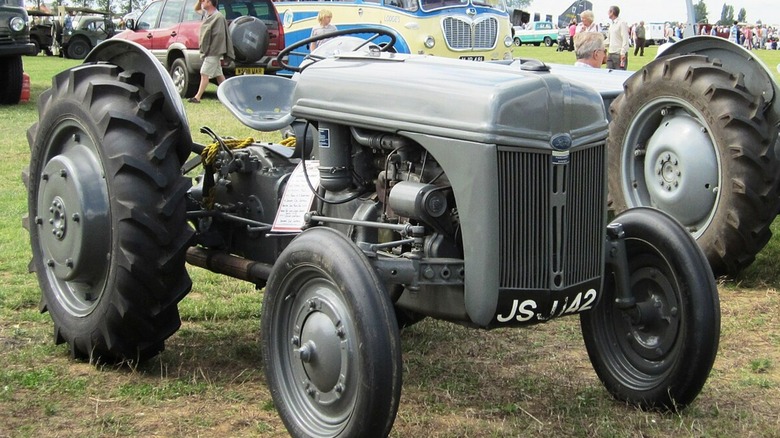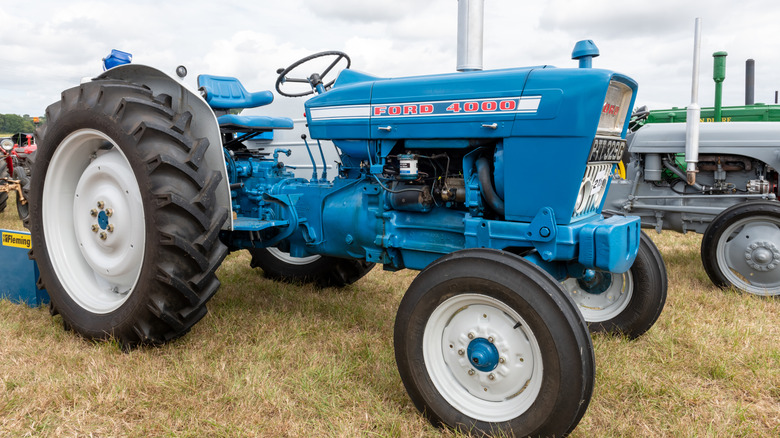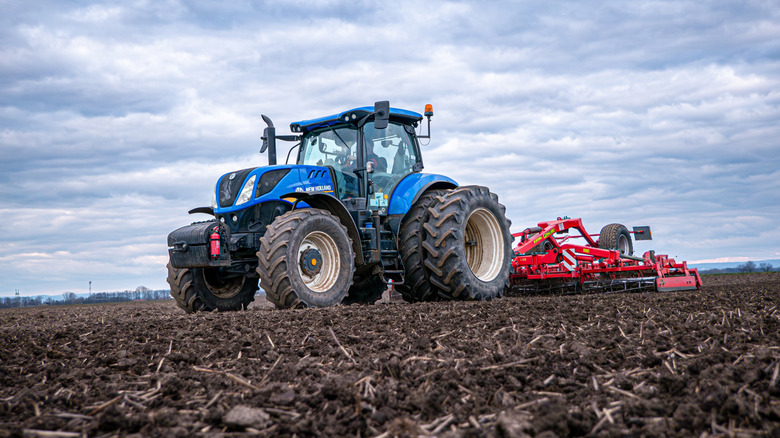When (And Why) Did Ford Stop Making Tractors?
The Ford Motor Company has a long, rich history in which it has created a specific image for itself among the public. It's known as a rugged, American-made brand that has been on the cutting edge of automobile technology since the early 20th century, and it has created everything from cars to trucks and SUVs — including some especially large models. What some may not know is that Ford hasn't always been about vehicles designed for the open road. Early on, it even got into the tractor game.
Yes, once upon a time, Ford was one of the few car companies that made tractors. Its founder, Henry Ford, was fascinated by such technology in the early 1900s, cobbling together an experimental tractor dubbed the "automotive plow" around 1906. By 1917, the Fordson tractor became a reality, paving the way for a whole line of Ford-made tractors in the coming decades.
Some of its best-known models beyond the Fordson include the Ford Model 9N; the Ford Model 600, 700, 800, and 900; and the Ford Model 2000, 4000, and 6000, to name a few. Ford tractors notably went to aid in food production in Britain during World War I and helped out farmers in the United States during World War II.
Ultimately, though, the company wasn't to remain in the agricultural game forever, letting it go just before the dawn of the new millennium.
Ford let its agricultural efforts go in the 1990s
After just under a century of contributing to the agricultural world, Ford officially concluded its run as a tractor manufacturer in 1991. It sold its tractor division to Fiat that year, which didn't come as too much of a surprise when the deal went through. As reported by the Chicago Tribune at the time of the sale, by the start of the 1990s, Ford had set its sights on departing the tractor business and made its intentions known publicly. The company may not have cited one specific reason for its choice to stop selling tractors, but historical context might explain why it ultimately chose to do so.
By the time the Ford-Fiat tractor deal became official, the agricultural world was shifting in massive ways. In the wake of the farm crisis of the 1980s — a period of extreme economic strain that resulted in the collapse of numerous small farms and rural communities across the United States — sweeping consolidation had taken place in the agricultural industry. Equipment became more expensive to acquire and maintain, many operations went global, and priorities at Ford shifted. It was said at the time that the brand wanted to return to a more streamlined, focused business strategy, which ventures like farm equipment manufacturing simply weren't.
Even though Ford got out of the tractor game decades ago, in very small part, its legacy within the space can still be felt today.
Ford's tractor legacy sort of lives on
Despite selling off its tractor business to Fiat in 1991, Ford didn't disappear from agriculture immediately. One of the conditions of the landmark sale was that Fiat could use the Ford name for the first 10 years of production, so technically speaking, Ford-branded tractors were still around for a bit after the sale went through. Also, in a roundabout way, Ford's impact on tractors can still be felt all these years later. It contributed to a domino effect of business moves and mergers that the results of can be observed today.
Way back in 1985, Ford did the opposite of what it would do a mere few years later. It bought further into the farm equipment world with its acquisition of Sperry Corporation's New Holland. The Los Angeles Times reported that the sale, designed partially to get Sperry out of a tumultuous market, went through for a whopping $330 million. Fiat purchased 80% of Ford New Holland in 1991. Come 1999, Fiat's New Holland merged with Case Corporation to form Case New Holland (CNH), and its tractors were branded strictly as New Holland with the 10-year Ford branding period over.
It's a convoluted and somewhat confusing lineage, but in some small way, with New Holland tractors doing all kinds of agricultural work in the modern era — including one of the most expensive tractors ever made — Ford's tractor legacy is kept alive. Had the automotive juggernaut not purchased New Holland and later passed it along to Fiat, leading to the Case Corporation merger, it's anyone's guess as to whether the brand would be so commonplace today.


